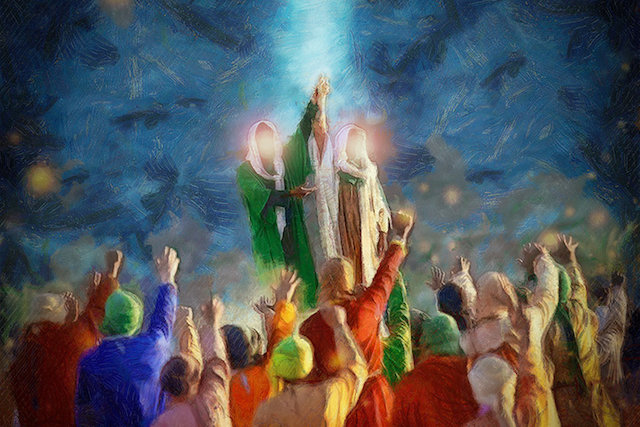I would like to congratulate all the dear audience, the dear brothers and sisters, the dear people of Iran, all Shia Muslims and all those people who feel proud of and who enjoy the truths of Islam and knowledge about the content of this holy religion on the occasion of the auspicious day of Eid al-Ghadir[...]
I would like to say a few things about the issue of Ghadir and then I will say a few things about the responsibilities that the issue of Ghadir and awareness about the deep lessons of Ghadir entrusts to us. We should pay attention to these responsibilities.
The issue of Ghadir is a very important issue in the history of Islam. First, the essence of this astonishing and important event and this holy statement - "Whomsoever's Moula [leader] I am, Ali is also his Moula" - is not something that has been narrated by Shia only. This event is among clear and absolute truths. Those who wanted to find faults with this event did not cast doubts on the origin of this statement. Rather, they resorted to ta'weel and interpretation of this sentence.
The issue of Ghadir is a clear historical and Islamic issue. The doubts and questions - about the meaning of this sentence - that have come to the minds of some intellectual and philosophical newcomers of today are the same doubts and questions that have been raised since a thousand years ago. And these questions have been answered by great ulama. Therefore, there is not any room for raising doubts about the essence of this issue, this event and what the Holy Prophet (s.w.a.) said.

February 20, 2003
On that day, the Holy Prophet (s.w.a.) asked the people, "Am I not closer to you than your own selves?" This sentence was a reference to a Quranic ayah which said, "The Prophet is closer to the believers than their own selves" [The Holy Quran, 33: 6]. Then, the Holy Prophet (s.w.a.) said, "Whomsoever's Moula I am, Ali is also his Moula". So, there is not any room for doubt about the essence of this issue.
What should be said about the content of this historical, holy and meaningful sentence - apart from the appointment of the Commander of the Faithful (a.s.) as the caliph and Imam after the Holy Prophet (s.w.a.) which is the common meaning of this sentence - is that there is another important issue which should not be ignored. This issue is the attention of Islam to the issue of government and politics and the significance of this issue from the viewpoint of Islam.
The answer to those people who have tried to throw Islam out of the arena of social and political issues, to confine it to personal and individual affairs and to adopt a secular outlook towards Islam - the hands of the enemies and their propaganda efforts have been promoting this outlook among Muslims for many years - is the issue of Ghadir. At the command of Allah the Exalted, the Holy Prophet (God's greetings be upon him and his household) addressed an important and fundamental issue in that sensitive condition and during the last months of his life. This important issue was attending to the issue of government after the Holy Prophet's (s.w.a.) time.
Here, the appointment of the Commander of the Faithful (a.s.) was not confined to spiritual aspects. Rather, it can be said that spiritual aspects are not things that someone can be appointed and elected for. Those issues for which someone can be appointed are government, politics and the management of the country and the Islamic society. The Holy Prophet (s.w.a.) recommended this to the people. This is an important point on the issue of Ghadir and it is a rejoinder to all those people who think and promote the idea that Islam should be kept away from political issues, issues related to the government and the like.
Therefore, these two truths - that is to say, the truth about the appointment of the Commander of the Faithful (a.s.) as the Imam after the Holy Prophet (s.w.a.) and the truth about attending to the issue of government, politics, imamate and managing the Islamic Ummah after the Holy Prophet (s.w.a.) - and these two very important and sensitive issues exist in the event of Ghadir. They are among teachings that have been guaranteed by Ghadir and they are a great lesson for all Muslims, whether for their present time or for their future.
Today, what we should pay attention to is that the issue of Ghadir is an ideological issue. Shia and the followers of the school of the Holy Prophet's (s.w.a.) household and the school of imamate are committed to the issue of Ghadir. Without a doubt, this is the base of Shia philosophy and there is no room for any discussion on this issue. Those who doubt this and those who have a question in this regard can take part in scholarly and expert meetings and discuss it.
Shia's logic is strong. Its reasoning is decisive and impeccable. However, this should not influence the public lives of Muslims, their cooperation with and brotherhood towards one another. The issue of differences between Muslim denominations - whether Shia and Sunni denominations or the different denominations that exist inside these two major denominations - has been one of the targets of the greed of the enemies of Islam, not just the enemies of Shia Islam.
For many years, there has been an effort to create discord between Muslims. This is because the existence of discord between Muslims will make them spend their efforts, energy and motivation on domestic fights. This makes them ignore foreign affairs and their great enemies. This has been the major policy of colonialism for many years and after the victory of the Islamic Revolution and the formation of the Islamic Republic. Because they witnessed the development of the Islamic Republic's thoughts in the world of Islam, they placed more emphasis on and showed more persistence in creating discord. They invested in doing this in order to separate the world of Islam from the Islamic Republic.
The Islamic Republic, our great Revolution and our great Imam (r.a.) managed to attract the thoughts of the world of Islam and the hearts of Muslims. They managed to channel their motivations and their moves. This frightened the enemy. This frightened colonialism, arrogance and Zionism - particularly American politicians. As a result of this, they resorted to their old weapon which is the weapon of creating discord.
Since many years ago until today, they have been fueling the fire of discord between Shia and Sunni so that they can divert the attention of the two sides from the main enemy - who is the enemy of Islam, not the enemy of Shia or Sunni in particular - and so that they can busy them with each other. This is the policy of colonialism. And the experts on this policy are the political and security hands of the vile English government which has been active in this area since long ago. They have made many efforts in this area and they know how to create discord between Muslim denominations. They have experience in the ways for doing this. Therefore, they know how to do it and they are extremely active in this arena.
Oct 13, 2014



 ۹۷/۱۱/۲۸
۹۷/۱۱/۲۸



